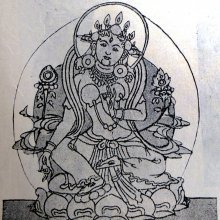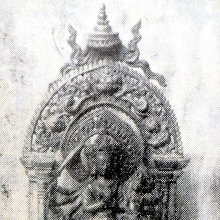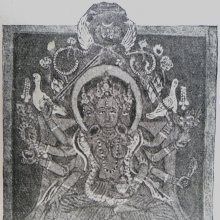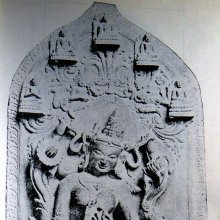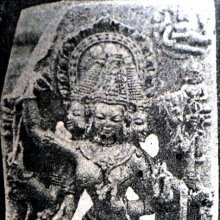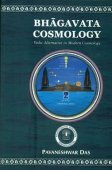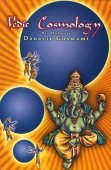Statement: 1 definition
Introduction:
Statement means something in Hinduism, Sanskrit. If you want to know the exact meaning, history, etymology or English translation of this term then check out the descriptions on this page. Add your comment or reference to a book if you want to contribute to this summary article.
Images (photo gallery)
(+6 more images available)
In Hinduism
Yoga (school of philosophy)
Source: ORA: Amanaska (king of all yogas): A Critical Edition and Annotated Translation by Jason BirchStatements (of various scriptures) are denoted by the Sanskrit term Vākya, according to the 17th century Yogacintāmaṇi by Śivānanda: a large compilation of roughly 3423 verses dealing with the various methods of (Haṭha) Yoga and Aṣṭāṅgayoga.—Accordingly, “Only this Yoga called seedless Samādhi is a means to the goal of the supreme self and without this [Samādhi], there is not even the possibility of liberation. In regard to this, [the following] statements (vākya) of the Vedas, Dharmaśāstras, Epics, Purāṇas and so on are the authority”.

Yoga is originally considered a branch of Hindu philosophy (astika), but both ancient and modern Yoga combine the physical, mental and spiritual. Yoga teaches various physical techniques also known as āsanas (postures), used for various purposes (eg., meditation, contemplation, relaxation).
See also (Relevant definitions)
Partial matches: Statement, Te.
Query error!
Full-text (+1565): Purvapaksha, Apadesha, Uddesha, Deshya, Kriyavasanna, Vyastapada, Ukti, Brahmanavacana, Pariganana, Vakya, Upanyasa, Bayan, Bayana, Shastravada, Nirnaya, Vyajokti, Shraddha, Pratijna, Phakkika, Nirdesha.
Relevant text
Search found 476 books and stories containing Statement, Statements, The statement; (plurals include: Statements, Statementses, The statements). You can also click to the full overview containing English textual excerpts. Below are direct links for the most relevant articles:
Nyaya-Vaisheshika (critical and historical study) (by Aruna Rani)
Nature of Testimony (sabda) < [Chapter 3 - Theory of Pramanas (epistemology)]
Sabda as an independent Pramana < [Chapter 3 - Theory of Pramanas (epistemology)]
Division of Testimony (sabda) < [Chapter 3 - Theory of Pramanas (epistemology)]
Siddhanta Sangraha of Sri Sailacharya (by E. Sowmya Narayanan)
Chapter 36 - The Validity of Śrī Pañcarātra
Chapter 16 - The Path of Surrender
Nyayakusumanjali of Udayana (study) (by Sri Ramen Bhadra)
Verbal testimony and God < [Chapter 3a - The Third Stavaka]
Nyāya view on validity of Veda < [Chapter 2 - The first and second Stavakas]
Real meaning of Injunction < [Chapter 4 - Fifth Stavaka]
Liberation in early Advaita Vedanta (by Aleksandar Uskokov)
2. The Scope of Para-vidyā Texts < [Chapter 8 - Vedānta-Vākya and the Identity Statements]
3. The Identity Statements of the Upaniṣads < [Chapter 8 - Vedānta-Vākya and the Identity Statements]
4. Nididhyāsana and Parisaṅkhyāna < [Chapter 9 - Liberation and the Inquiry into Brahman]
Brahma Sutras (Ramanuja) (by George Thibaut)
Sutra 3.3.26 < [Third Adhyaya, Third Pada]
Sutra 3.4.18 < [Third Adhyaya, Fourth Pada]
Sutra 4.2.4 < [Fourth Adhyaya, Second Pada]
Mandukya Upanishad (Gaudapa Karika and Shankara Bhashya) (by Swami Nikhilananda)
Mandukya Karika, verse 4.57 < [Chapter IV - Alatashanti Prakarana (Quenching the firebrand)]
Mandukya Karika, verse 3.14 < [Chapter III - Advaita Prakarana (Non-duality)]
Mandukya Karika, verse 3.15 < [Chapter III - Advaita Prakarana (Non-duality)]
Related products
(+4 more products available)
